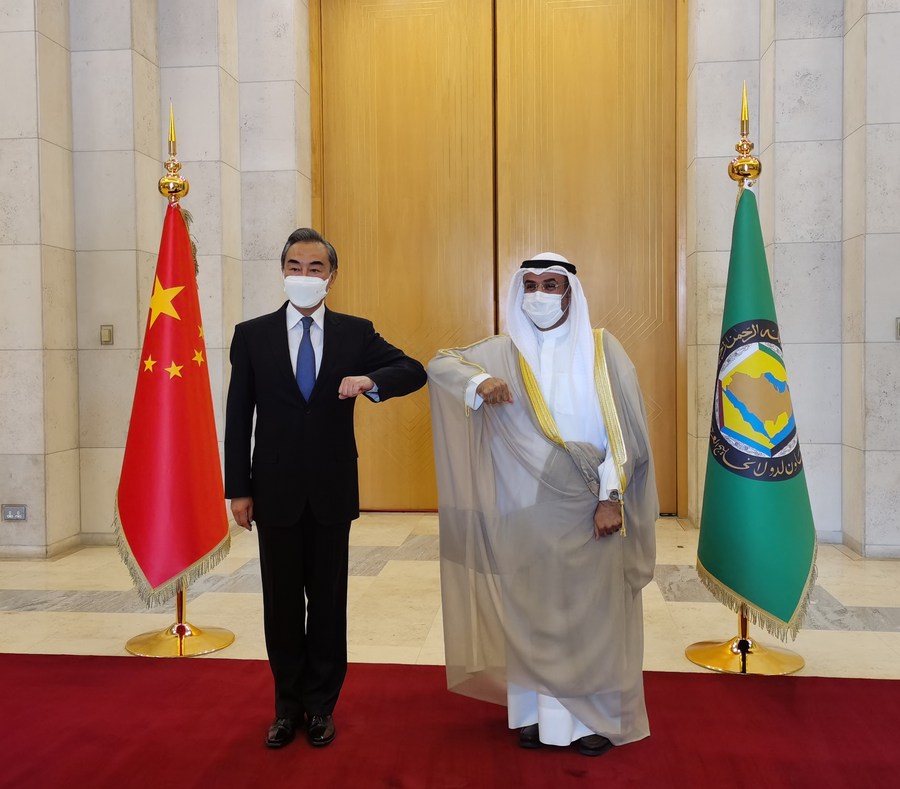
Visiting Chinese State Councilor and Foreign Minister Wang Yi (L) meets with Secretary-General of the Gulf Cooperation Council (GCC) Nayef bin Falah Al-Hajraf in Riyadh, Saudi Arabia, on March 24, 2021. (Photo by Song Boqi/Xinhua)
China wishes to propose a five-point initiative on achieving security and stability in the Middle East, namely advocating mutual respect, upholding equity and justice, achieving non-proliferation, jointly fostering collective security, and accelerating development cooperation, Chinese State Councilor and Foreign Minister Wang Yi said.
by Xinhua writer Tu Yifan
RIYADH, March 27 (Xinhua) -- The international community should fully respect the will of regional countries and contribute to stability and peace in the Middle East, Chinese State Councilor and Foreign Minister Wang Yi has said in a recent interview with Al Arabiya TV channel.
For the region to emerge from chaos and enjoy stability, it must break free from the shadows of big-power geopolitical rivalry and independently explore development paths suited to its regional realities, Wang told the media in Riyadh on Wednesday, stressing that the international community should neither overstep its responsibility nor simply sit by and look on.
China has established diplomatic relations with all the countries in the Middle East, and elevated its relations with 13 Middle East countries to strategic partnerships, he said, adding that China is also the biggest trading partner and a major investor in the Middle East.
"China has become a staunch defender, builder and contributor to the current international order," Wang said, noting that China's relations and cooperation with countries in the Middle East will enjoy even greater prospects.
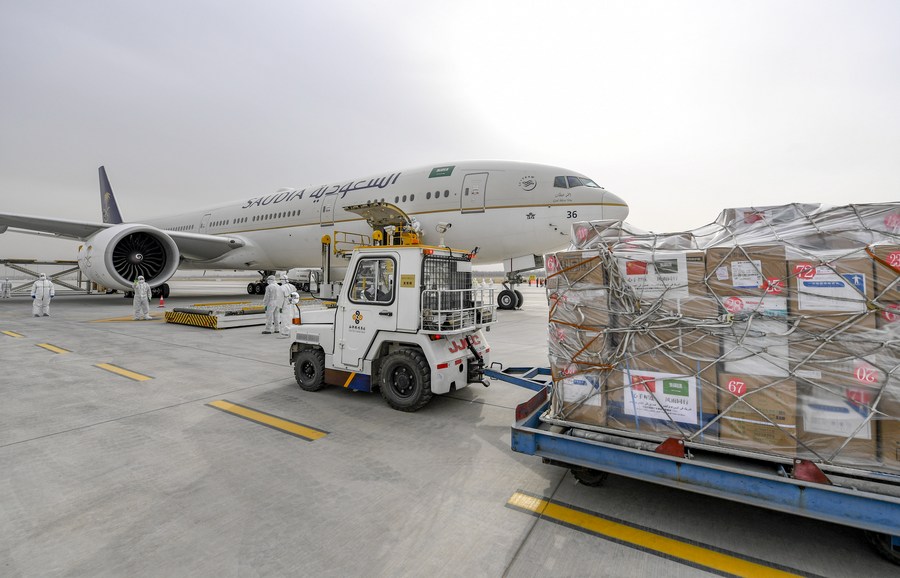
Photo taken on April 15, 2020 shows the donated medical supplies to be transported to the Saudi Arabia in Yinchuan, capital of northwest China's Ningxia Hui Autonomous Region. (Xinhua/Feng Kaihua)
INITIATIVE FOR REGIONAL STABILITY
"COVID-19 is still spreading in the region, turbulence persists, and hotspot issues are evolving amid twists and turns," Wang said. "The region is again at a crossroads."
Against this backdrop, he said, China wishes to propose a five-point initiative on achieving security and stability in the Middle East, namely advocating mutual respect, upholding equity and justice, achieving non-proliferation, jointly fostering collective security, and accelerating development cooperation.
As it fosters a new development paradigm, Wang said, China is ready to share with Middle East countries its market opportunities, work with Arab countries to actively prepare for the China-Arab states summit, promote high-quality Belt and Road cooperation, and expand new areas of growth such as high and new technologies.
"We also look forward to early conclusion of a free trade agreement with the Gulf Cooperation Council," he added.
"China is prepared to stay in close touch with all sides on the five-point initiative, and work closely to promote peace, security and development in the Middle East," Wang said.
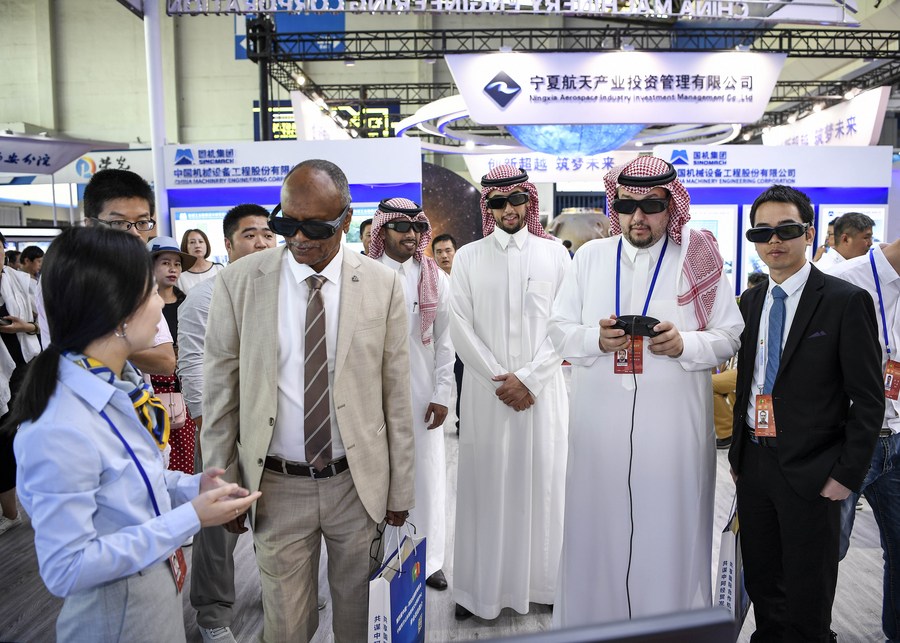
Guests from Saudi Arabia learn about a smart mapping and modeling system based on unmanned aerial vehicles during the fourth China-Arab States Expo in Yinchuan, northwest China's Ningxia Hui Autonomous Region, Sept. 6, 2019. (Xinhua/Li Mangmang)
CHINA-ARAB RELATIONS
According to Wang, there were three impressive markers, or three "number ones," in China-Arab relations in 2020.
With two-way trade approaching 240 billion U.S. dollars last year, China stayed comfortably as the largest trading partner of Arab states. Half of China's crude oil import came from Arab states, which contributed the biggest source of China's oil import. At the ninth Ministerial Conference of the China-Arab States Cooperation Forum, the two sides agreed to hold the first ever China-Arab states summit.
Wang said China-Arab relations have become a fine example of state-to-state relations and South-South cooperation, adding that building a China-Arab states community with a shared future has become the goal and guiding vision for the development of their relations.
Toward this vision, China and Arab states should build a community with a shared future based on common convictions and pursuits, featuring tranquility and harmony, and in pursuit of development and prosperity, Wang explained.
When it comes to China's internal affairs including Xinjiang and Hong Kong, the countries and peoples in the Middle East are clear-eyed about the truth, and have been resolute in supporting China, Wang told Al Arabiya.
He said an outcome document of the Ninth Ministerial Meeting of the China-Arab States Cooperation Forum stressed China's important efforts to care for the ethnic minorities and expressed support for China's just position regarding Hong Kong.
At the recently concluded session of the UN Human Rights Council, 21 Arab states spoke up for justice in support of China, Wang added, noting that China highly appreciates that.
"We would like to work with Arab and Islamic countries in the region to continue upholding the principle of non-interference and jointly safeguard the legitimate rights and interests of developing countries," Wang said.
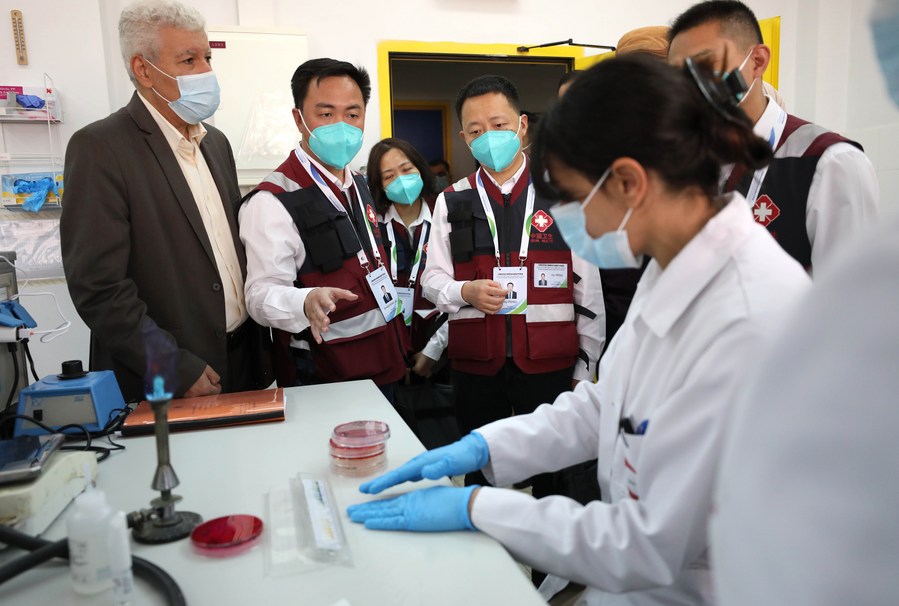
Members of a Chinese medical team visit Palestinian Health Ministry's Central Health Laboratories in the West Bank city of Ramallah, June 14, 2020. (Photo by Ayman Nobani/Xinhua)
COOPERATION ON COVID-19 RESPONSE
During the COVID-19 pandemic, mutual assistance between China and Arab states has set a fine example of solidarity and cooperation in difficult times, Wang said.
China shared without reservation its prevention, control, diagnostic and therapeutic experience, and provided much-needed medical supplies to other countries, serving as an important supplier and a source of strength in this global fight, he added.
Wang said that in this joint fight, our most fundamental belief lies in our shared future, the most outstanding feature is our pioneering spirit, and the most precious bond is our shared belief.
"China has conducted anti-COVID cooperation with all Arab states," he said.
"We reached out to the people of Palestine and Palestinian refugees in surrounding areas, and people in Syria and other conflict zones. We provided a large amount of ventilators, test reagents, forehead thermometers, masks, goggles and protective suits," he said, adding that nearly 100 visits were made by Chinese medical experts to eight Arab states.
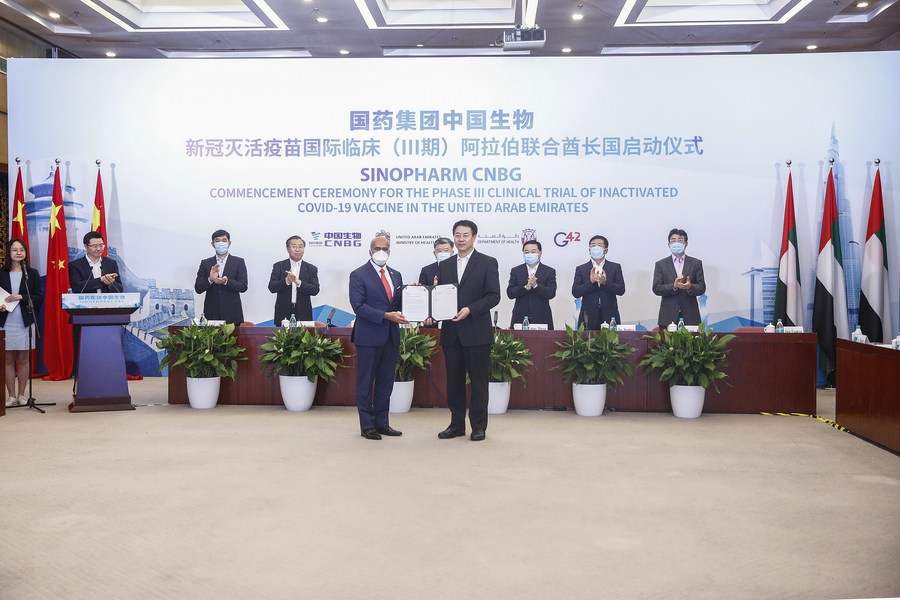
A commencement ceremony for the phase 3 clinical trial of inactivated COVID-19 vaccine in the United Arab Emirates is held in Beijing, capital of China, June 23, 2020. (Xinhua)
Wang also praised that Arab states are among the first to cooperate with China on vaccines. As the first foreign country to host phase III trials for the Chinese vaccine, the United Arab Emirates has made a significant contribution to the success of the R&D of the vaccine.
He also pointed out that the joint statement on solidarity against COVID-19 issued at the Ninth Ministerial Conference of the China-Arab States Cooperation Forum held last year underscored the importance of closer international cooperation and support for the lead role of the World Health Organization.
"By standing up against attempts to politicize or label the virus, China and Arab states played an important role in building global consensus and pooling global resources against the pandemic," Wang said. ■




